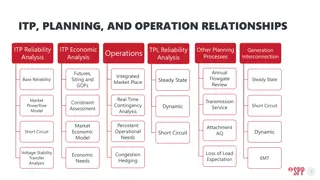
Understanding C++ Memory Allocation and Pointers
Dive into the world of memory allocation in C++ with a focus on stack vs. heap, array allocation, object allocation, and deallocation using new and delete keywords. Learn about best practices for managing memory in C++ programming.
Download Presentation

Please find below an Image/Link to download the presentation.
The content on the website is provided AS IS for your information and personal use only. It may not be sold, licensed, or shared on other websites without obtaining consent from the author. If you encounter any issues during the download, it is possible that the publisher has removed the file from their server.
You are allowed to download the files provided on this website for personal or commercial use, subject to the condition that they are used lawfully. All files are the property of their respective owners.
The content on the website is provided AS IS for your information and personal use only. It may not be sold, licensed, or shared on other websites without obtaining consent from the author.
E N D
Presentation Transcript
Lecture Participation Poll #21 Log onto pollev.com/cse374 Or Text CSE374 to 22333 Lecture 21: C++ Continued CSE 374: Intermediate Programming Concepts and Tools 1
Administrivia HW 3 posted Friday -> Extra credit due date Wednesday Nov 25th @ 9pm End of quarter due date Wednesday December 16 End of quarter due date Wednesday December 16th th @ 9pm @ 9pm CSE 374 AU 20 - KASEY CHAMPION 2
Stack vs Heap Java - Stack: cannot stack-allocate objects - Heap: can only directly allocate pointers to objects, all objects are dynamically allocated in the heap - new Thing( ) calls constructor, returns heap allocated pointer - garbage collector frees allocated memory, outside of programmer responsibility C - Stack: can stack-allocate a struct, then initialize individual variables within stack as well, does not persist beyond single function - Heap: use malloc to dynamically allocate memory on the heap, must initialize data explicitly afterwards. - Must free this memory exactly once later. - Malloc returns untyped pointers. C++ - Stack: can directly stack-allocate or call a constructor that allocates a pointer in the stack to object constructed. - Heap: use of new keyword allocates space in heap for object, returns pointer to object which if stored in local variable will be saved in the stack. Can also simultaneously allocate and initialize heap data EG: new int(42) - Like C must deallocate dynamically allocated memory, but must use delete instead of free. CSE 374 AU 20 - KASEY CHAMPION 3
Allocating memory in C++ In C int* arr = (int*) malloc(sizeof(int) * 100); // returns non-typed pointer free(arr); In C++, we have more modern syntax: - Array allocation int* arr = new int[100]; delete [] arr; // [] required to free array memory - Non-array allocation int* x = new int(4); // x stores the value 4 delete x; CSE 374 AU 20 - KASEY CHAMPION 4
new / delete int* AllocateInt(int x) { int* heapy_int = new int; *heapy_int = x; return heapy_int; } To allocate on the heap using C++, you use the new keyword instead of malloc() from stdlib.h - You can use new to allocate an object (e.g. new Point) - You can use new to allocate a primitive type (e.g. new int) To deallocate a heap-allocated object or primitive, use the delete keyword instead of free() from stdlib.h - Don t mix and match! - Never free free() something allocated with new - Never delete something allocated with malloc - Careful if you re using a legacy C code library or module in C++ Point* AllocatePoint(int x, int y) { Point* heapy_pt = newPoint(x,y); return heapy_pt; } heappoint.cpp #include "Point.h" // definitions of AllocateInt() and AllocatePoint() int main() { Point* x = AllocatePoint(1, 2); int* y = AllocateInt(3); cout << "x's x_ coord: " << x->get_x() << endl; cout << "y: " << y << ", *y: " << *y << endl; delete x; delete y; return EXIT_SUCCESS; malloc() } CSE 374 AU 20 - KASEY CHAMPION 5
Malloc vs New malloc() new What is it? a function an operator or keyword How often used (in C)? often never How often used (in C++)? rarely often arrays, structs, objects, primitives Allocated memory for anything a void* (should be cast) appropriate pointer type (doesn t need a cast) Returns returns NULL When out of memory throws an exception free() delete or delete[] Deallocating CSE 374 AU 20 - KASEY CHAMPION 6
Dynamically Allocated Arrays To dynamically allocate an array: type* name = new type[size]; -calls default (zero-argument) constructor for each element -convenient if there s a good default for initialization To dynamically deallocate an array: - Use delete[] name; - It is an incorrectto use delete name; on an array - The compiler probably won t catch this, though (! !) because it can t always tell if name* was allocated with new type[size]; or new type; - Especially inside a function where a pointer parameter could point to a single item or an array and there s no way to tell which! - Result of wrong delete is undefined behavior CSE 374 AU 20 - KASEY CHAMPION 7
Arrays Example (Primitives) arrays.cpp #include "Point.h" int main() { int stack_int; int* heap_int = new int; int* heap_int_init = new int(12); int stack_arr[3]; int* heap_arr = new int[3]; int* heap_arr_init_val = new int[3](); int* heap_arr_init_lst = new int[3]{4, 5}; // C++11 ... delete heap_int; // delete heap_int_init; // delete heap_arr; // delete[] heap_arr_init_val; // return EXIT_SUCCESS; } CSE 374 AU 20 - KASEY CHAMPION 8
Arrays Example (Objects) arrays.cpp #include "Point.h" int main() { ... Point stack_pt(1, 2); Point* heap_pt = new Point(1, 2); Point* heap_pt_arr_err = new Point[2]; Point* heap_pt_arr_init_lst = new Point[2]{{1, 2}, {3, 4}}; / / C++11 ... delete heap_pt; delete[] heap_pt_arr_init_lst; return EXIT_SUCCESS; } CSE 374 AU 20 - KASEY CHAMPION 9
Pointers in C++ Work the same as in C, hooray! A pointer pointer is a variable containing an address - Modifying the pointer doesn t modify what it points to, but you can access/modify what it points to by dereferencing int main(int argc, char** argv) { int x = 5, y = 10; int* z = &x; *z += 1; // sets x to 6 x += 1; // sets x (and *z) to 7 z = &y; // sets z to the address of y *z += 1; // sets y (and *z) to 11 return EXIT_SUCCESS; } CSE 374 AU 20 - KASEY CHAMPION 10
References in C++ A reference reference is an alias for another variable - Alias: another name that is bound to the aliased variable - Mutating a reference is is mutating the aliased variable - Introduced in C++ as part of the language int main(int argc, char** argv) { int x = 5, y = 10; int& z = x; // binds the name "z" to x z += 1; // sets z (and x) to 6 x += 1; // sets x (and z) to 7 z = y; // sets z (and x) to the value of y z += 1; // sets z (and x) to 11 return EXIT_SUCCESS; } CSE 374 AU 20 - KASEY CHAMPION 11
Pass by Reference C++ allows you to use real pass - Client passes in an argument with normal syntax - Function uses reference parameters with normal syntax - Modifying a reference parameter modifies the caller s argument! pass- -by by- -reference reference - In C all function arguments are copies - pointer arguments pass a copy of the address value, original values will be unaffected by changes to parameter A stylistic choice, not mandated by the C++ language void swap(int& x, int& y) { int tmp = x; x = y; y = tmp; } Google C++ style guide suggests: - Input parameters: - Either use values (for primitive types like int or small structs/objects) - Or use const references (for complex struct/object instances) - Output parameters: - Use unchangeable pointers referencing changeable data - Ordering: - List input parameters first, then output parameters last int main(int argc, char** argv) { int a = 5, b = 10; swap(a, b); cout << "a: " << a << "; b: " << b << endl; return EXIT_SUCCESS; } CSE 374 AU 20 - KASEY CHAMPION 12
Structs in C vs Classes in C++ In C, a struct can only contain data fields - No methods and all fields are always accessible In C++, struct and class are (nearly) the same! - Both can have methods and member visibility (public/private/protected) - Minor difference: members are default default public -structs need to allocate heap memory so object will persist Common style convention: - Use struct for simple bundles of data - Use class for abstractions with data + functions public in a struct and default default private private in a class CSE 374 AU 20 - KASEY CHAMPION 13
Classes in C++ MyClass.h namespace mynamespace { class MyClass { private: type fieldOne; type fieldTwo; Unlike C structs - Class definition is part of interface and should go in .h file - Private members still must be included in definition (! !) - Typically put member function definitions into companion .cpp file with implementation details - Common exception: setter and getter methods - These files can also include non-member functions that use the class Like java - Fields & methods, static vs instance, constructors - method overloading (functions, operators and constructors) Not quite like Java - access-modifier (eg private) syntax - declaration separate from implementation (like C) - funny constructor syntax, default parameters (eg, =0) Not at all like Java - you can name files anything you want - Typically a combination of Name.cpp and Name.h for class Name - destructors and copy constructors - virtual vs non-virtual public: MyClass(); MyClass(type, type); public: type functionOne() { // function definition } type functionTwo() { // function definition } }; } CSE 374 AU 20 - KASEY CHAMPION 14
Defining Classes in C++ Class Definition (in a .h file) Name.h class Name { public: // public member definitions & declarations go here private: // private member definitions & declarations go here }; // close class Name Class Member Definition (in a .cpp file) Name.cpp returnType ClassName::MethodName(type1 param1, , typeN paramN) { // body statements } Members can be functions (methods) or data (variables) (1) define within the class definition OR (2) declare within the class definition and then define elsewhere CSE 374 AU 20 - KASEY CHAMPION 15
Anatomy of C++ Class Rectangle.h CSE 374 AU 20 - KASEY CHAMPION 16
Access Control Access modifiers for members: - public: accessible to all parts of the program - private: accessible to the member functions of the class - Private to class, not object instances - protected: accessible to member functions of the class and any derived classes (subclasses more to come, later) Reminders: - Access modifiers apply to all members that follow until another access modifier is reached - If no access modifier is specified, struct members default to public and class members default to private CSE 374 AU 20 - KASEY CHAMPION 17
Class Definition (Member declaration) Point.h #ifndef POINT_H_ #define POINT_H_ class Point { public: Point(const int x, const int y); // constructor int get_x() const { return x_; } // inline member function int get_y() const { return y_; } // inline member function double Distance(const Point& p) const; // member function void SetLocation(const int x, const int y); // member function private: int x_; // data member int y_; // data member }; // class Point #endif // POINT_H_ CSE 374 AU 20 - KASEY CHAMPION 18
Class Member Definition Point.cpp #include <cmath> #include "Point.h" Point::Point(const int x, const int y) { x_ = x; this->y_ = y; // "this->" is optional unless name conflicts } double Point::Distance(const Point& p) const { // We can access p s x_ and y_ variables either through the // get_x(), get_y() accessor functions or the x_, y_ private // member variables directly, since we re in a member // function of the same class. double distance = (x_ - p.get_x()) * (x_ - p.get_x()); distance += (y_ - p.y_) * (y_ - p.y_); return sqrt(distance); } void Point::SetLocation(const int x, const int y) { x_ = x; y_ = y; } CSE 374 AU 20 - KASEY CHAMPION 19
Class Usage usePoint.cpp #include <iostream> #include "Point.h" using namespace std; int main(int argc, char** argv) { Point p1(1, 2); // allocate a new Point on the Stack Point p2(4, 6); // allocate a new Point on the Stack To allocate on the heap use the new keyword Point* p1 = new Point(1, 2); cout << "p1 is: (" << p1.get_x() << ", "; cout << p1.get_y() << ")" << endl; cout << "p2 is: (" << p2.get_x() << ", "; cout << p2.get_y() << ")" << endl; cout << "dist : " << p1.Distance(p2) << endl; return 0; } CSE 374 AU 20 - KASEY CHAMPION 20
Constructors in C++ A constructor (ctor) initializes a newly-instantiated object - A class can have multiple constructors that differ in parameters - Which one is invoked depends on how the object is instantiated Written with the class name as the method name: Point(const int x, const int y); - C++ will automatically create a synthesized default constructor if you have no user-defined constructors - Takes no arguments and calls the default ctor on all non- plain old data (non-POD) member variables - Synthesized default ctor will fail if you have non-initialized const or reference data members 4 different types of constructors - default constructor takes zero arguments. If you don t define any constructors the compiler will generate one of these for you (just like Java) - copy constructor takes a single parameter which is a const reference(const T&) to another object of the same type, and initializes the fields of the new object as a copy of the fields in the referenced object - user-defined constructors initialize fields and take whatever arguments you specify - conversion constructors implicit, take a single argument. If you want a single argument constructor that is not implicit must use the keyword explicit like: explicit String(const char* raw); CSE 374 AU 20 - KASEY CHAMPION 21
Synthesized Default Constructor SimplePoint.h class SimplePoint { public: // no constructors declared! int get_x() const { return x_; } // inline member function int get_y() const { return y_; } // inline member function double Distance(const SimplePoint& p) const; void SetLocation(int x, int y); SimplePoint.cpp private: int x_; // data member int y_; // data member }; // class SimplePoint #include "SimplePoint.h" ... // definitions for Distance() and SetLocation() int main(int argc, char** argv) { SimplePoint x; // invokes synthesized default constructor return EXIT_SUCCESS; } CSE 374 AU 20 - KASEY CHAMPION 22
Synthesized Default Constructor If you define any constructors, C++ assumes you have defined all the ones you intend to be available and will not add any others #include "SimplePoint.h" // defining a constructor with two arguments SimplePoint::SimplePoint(const int x, const int y) { x_ = x; y_ = y; } void foo() { SimplePoint x; // compiler error: if you define any // ctors, C++ will NOT synthesize a // default constructor for you. SimplePoint y(1, 2); // works: invokes the 2-int-arguments // constructor } CSE 374 AU 20 - KASEY CHAMPION 23
Overloading Constructors #include "SimplePoint.h" // default constructor SimplePoint::SimplePoint() { x_ = 0; y_ = 0; } // constructor with two arguments SimplePoint::SimplePoint(const int x, const int y) { x_ = x; y_ = y; } void foo() { SimplePoint x; // invokes the default constructor SimplePoint y(1, 2); // invokes the 2-int-arguments ctor SimplePoint a[3]; // invokes the default ctor 3 times } CSE 374 AU 20 - KASEY CHAMPION 24
Copy Constructors C++ has the notion of a copy constructor (cctor) - Used to create a new object as a copy of an existing object - Initializer lists can also be used in copy constructors - initializes a new bag of bits (new variable or parameter) - assignment (=) replaces an existing value with a new one - may need to clean up old state (free heap data?) Point::Point(const int x, const int y) : x_(x), y_(y) { } // copy constructor Point::Point(const Point& copyme) { x_ = copyme.x_; y_ = copyme.y_; } void foo() { Point x(1, 2); // invokes the 2-int-arguments constructor Point y(x); // invokes the copy constructor Point z = y; // also invokes the copy constructor } CSE 374 AU 20 - KASEY CHAMPION 25
Synthesized Copy Constructor If you don t define your own copy constructor, C++ will synthesize one for you - It will do a shallow copy of all of the fields (i.e. member variables) of your class - Sometimes the right thing; sometimes the wrong thing #include "SimplePoint.h" ... // definitions for Distance() and SetLocation() int main(int argc, char** argv) { SimplePoint x; SimplePoint y(x); // invokes synthesized copy constructor ... return EXIT_SUCCESS; } CSE 374 AU 20 - KASEY CHAMPION 26
When Do Copies Happen? The copy constructor is invoked if: - You initialize an object from another object of the same type: Point x; // default ctor Point y(x); // copy ctor Point z = y; // copy ctor - You pass a non-reference object as a value parameter to a function: void foo(Point x) { ... } Point y; // default ctor foo(y); // copy ctor Point foo() { Point y; // default ctor return y; // copy ctor } - You return a non-reference object value from a function: CSE 374 AU 20 - KASEY CHAMPION 27
Initialization Lists C++ lets you optionally declare an initialization list as part of a constructor definition - Initializes fields according to parameters in the list - The following two are (nearly) identical: Point::Point(const int x, const int y) { x_ = x; y_ = y; std::cout << "Point constructed: (" << x_ << ","; std::cout << y_<< ")" << std::endl; } // constructor with an initialization list Point::Point(const int x, const int y) : x_(x), y_(y) { std::cout << "Point constructed: (" << x_ << ","; std::cout << y_<< ")" << std::endl; } CSE 374 AU 20 - KASEY CHAMPION 28
Initialization vs Construction Data members in initializer list are initialized in the order they are defined in the class, not by the initialization list ordering - Data members that don t appear in the initialization list are default initialized/constructed before body is executed Initialization preferred to assignment to avoid extra steps - Never mix the two styles class Point3D { public: // constructor with 3 int arguments Point3D(const int x, const int y, const int z) : y_(y), x_(x) { z_ = z; } First, initialization list is applied. Next, constructor body is executed. private: int x_, y_, z_; // data members }; // class Point3D CSE 374 AU 20 - KASEY CHAMPION 29
Destructors C++ has the notion of a destructor (dtor) - Like free in c. In fact, invokes free under the hood to clean up when freeing memory - Invoked automatically when a class instance is deleted, goes out of scope, etc. (even via exceptions or other causes!) - Do not need to call destructors explicitly - Place to put your cleanup code free any dynamic storage or other resources owned by the object - Standard C++ idiom for managing dynamic resources - Slogan: Resource Acquisition Is Initialization (RAII) Point::~Point() { // destructor // do any cleanup needed when a Point object goes away // (nothing to do here since we have no dynamic resources) } CSE 374 AU 20 - KASEY CHAMPION 30
Nonmember Functions Nonmember functions are just normal functions that happen to use some class - Called like a regular function instead of as a member of a class object instance - These do nothave access to the class private members Useful nonmember functions often included as part of interface to a class - Declaration goes in header file, but outside of class definition A class can give a nonmember function (or class) access to its non-public members by declaring it as a friend friend within its definition - Not a class member, but has access privileges as if it were - friend functions are usually unnecessary if your class includes appropriate getter public functions class Complex { ... friend std::istream& operator>>(std::istream& in, Complex& a); ... }; // class Complex Complex.cpp std::istream& operator>>(std::istream& in, Complex& a) { ... } Complex.h CSE 374 AU 20 - KASEY CHAMPION 31
Questions CSE 374 AU 20 - KASEY CHAMPION 32
RAII char* return_msg_c() { int size = strlen("hello") + 1; char* str = malloc(size); strncpy(str, "hello", size); return str; } "Resource Acquisition is Initialization" Design pattern at the core of C++ When you create an object, acquire resources - Create = constructor - Acquire = allocate (e.g. memory, files) std::string return_msg_cpp() { std::string str("hello"); return str; } When the object is destroyed, release resources - Destroy = destructor - Release = deallocate When used correctly, makes code safer and easier to read using namespace std; char* s1 = return_msg_c(); cout << s1 << endl; string s2 = return_msg_cpp(); cout << s2 << endl; CSE 374 AU 20 - KASEY CHAMPION 33
Compiler Optimization The compiler sometimes uses a return by value optimization or move semantics to eliminate unnecessary copies - Sometimes you might not see a constructor get invoked when you might expect it Point foo() { Point y; // default ctor return y; // copy ctor? optimized? } Point x(1, 2); // two-ints-argument ctor Point y = x; // copy ctor Point z = foo(); // copy ctor? optimized? CSE 374 AU 20 - KASEY CHAMPION 34
Namespaces Each namespace is a separate scope - Useful for avoiding symbol collisions! Namespace definition: - namespace name { // declarations go here } - Doesn t end with a semi-colon and doesn t add to the indentation of its contents - Creates a new namespace name if it did not exist, otherwise adds to the existing namespace (! !) - This means that components (e.g. classes, functions) of a namespace can be defined in multiple source files Namespaces vs classes -They seems somewhat similar, but classes are not namespaces: - There are no instances/objects of a namespace; a namespace is just a group of logically-related things (classes, functions, etc.) - To access a member of a namespace, you must use the fully qualified name (i.e. nsp_name::member) - Unless you are using that namespace - You only used the fully qualified name of a class member when you are defining it outside of the scope of the class definition CSE 374 AU 20 - KASEY CHAMPION 35
Const C++ introduces the const keyword which declares a value that cannot change const int CURRENT_YEAR = 2020; CSE 374 AU 20 - KASEY CHAMPION 36






















